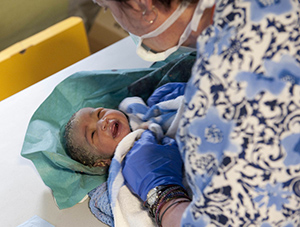DeClercq Contributes to Lancet Series Examining Midwifery.
A BUSPH professor is part of an international team that authored a wide-reaching series in The Lancet showing the myriad positive impacts of effective, high-quality midwifery – from saving lives, to preventing unnecessary medical interventions.
Eugene DeClercq, professor of community health sciences, co-authored the first of four papers in the series, examining the global contribution that midwifery can make to the quality of care of women and infants. The team identified more than 50 outcomes that could be improved by midwifery care, including reductions in maternal and neonatal mortality and morbidity, stillbirths and preterm births, and psychosocial outcomes. It also outlined a framework for providing effective care to women, babies, and families as part of a larger health care system.
“Our findings support a system-level shift from maternal and newborn care focused on identification and treatment of pathology for the minority, to skilled care for all,” DeClercq and his co-authors wrote. “This change includes preventive and supportive care that works to strengthen women’s capabilities in the context of respectful relationships, is tailored to their needs, focuses on promotion of normal reproductive processes, and in which first-line management of complications and accessible emergency treatment are provided when needed.

“Midwifery is pivotal to this approach, which requires effective interdisciplinary teamwork and integration across facility and community settings.”
New estimates included in the series suggest that in countries with the highest burden of infant and maternal deaths, over three-quarters of stillbirths and maternal and newborn deaths could be prevented in the next 15 years if effective midwifery was available to all women. Even if improvements in the coverage of midwifery services were much more modest, the potential for saving lives is significant; if coverage of midwifery services increased from current levels by just a quarter, the authors estimate that the current rate of maternal deaths could be halved by 2030.
While most maternal and child deaths occur in low- and middle-income countries where lack of access to effective midwifery is an obstacle to improving mothers’ and infants’ health, the series also says that over-medicalization of pregnancy is increasingly threatening the wellbeing of women and their families in both high-income and lower-income countries. The series’ authors argue that routine use of unnecessary interventions, including caesarean sections, limited mobility in labor, and episiotomy, can have a lasting effect on mothers’ and infants’ wellbeing.
